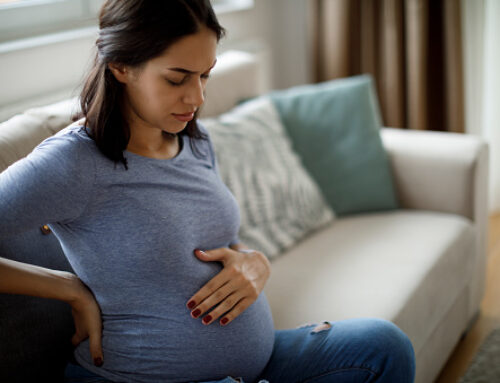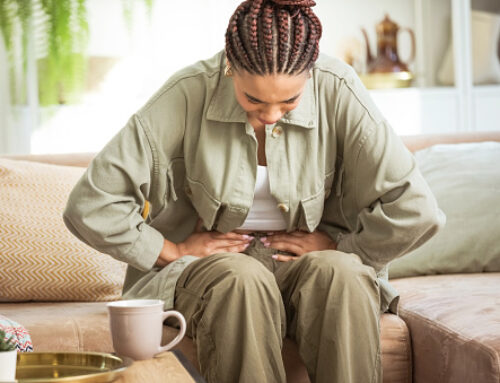Every woman experiences menopause differently. Some women will notice various changes and symptoms, while some report no symptoms at all except no longer getting their period. Researchers believe that the majority of the changes that occur to a woman’s body during menopause are due to hormonal changes, while some are due to general aging. It’s especially important for women to maintain a healthy lifestyle when they reach menopause as this can keep some of the unpleasant changes, like menopausal weight gain, at bay. Read on to find out more about the effects of menopause, including what causes menopausal weight gain and how to prevent it, and how to manage other menopausal changes.
Changes to the Reproductive System During Menopause
It is safe to say that menopause affects the reproductive system more than any other system in the female body. In fact, by definition, menopause is the end of the female reproductive life. This physiological process starts typically at around age 45 and progresses until a woman is no longer experiencing their monthly reproductive cycles. By the time most women reach age 51, their bodies most likely no longer are producing eggs for fertilization, indicating the end of fertility. This also means that they no longer experience menstruation.
Apart from this significant change, other changes occur in different areas of the female reproductive system. For instance, changes may happen to your urogenital system if you’re experiencing menopause. The uterus and the vagina, which are the main bodily parts of this system, are maintained by circulating estrogen. Due to the drop in estrogen during menopause, there will be marked atrophy of the vagina and thinning of the myometrium. Additionally, the vaginal walls will also start thinning and becoming dry. This explains why most women at this stage experience pain during sex.
The bladder and urethra are also not exempt from menopausal changes because they share embryological derivation with the uterus and vagina. As a result, as the uterus and the vagina start losing tone, the bladder and uterus also follow suit. This causes symptoms like urinary incontinence and increased urinary tract infections.
How Menopause Affects the Skeletal System
In young women, bone mass and density are protected by estrogen. This hormone reduces the production of osteoclasts (cells that degrade bone). Unfortunately, when estrogen levels drop during menopause, the balance is tipped and osteoclast production increases, speeding up bone reabsorption. This causes an acceleration of age-related loss of bone density and explains why women have a high risk of fractures post-menopause. Apart from fracturing easily, menopausal women are also at a higher risk of developing osteoporosis – when bones become weak and brittle. To slow down the loss of bone density, women are encouraged to exercise frequently and safely before and during menopause.
Menopause Weight Gain and Changes in Body Shape
One of the physical changes linked to menopause is female weight gain. This is often also accompanied by changes in your body shape. As a result, most women are always searching for ways how to prevent weight gain during menopause. Some women will often notice weight shifting from their hips and moving to the central tummy area during this period. This female weight gain and change in fat distribution can be attributed to hormonal changes.
Apart from hormonal changes caused by menopause, general aging, lifestyle, and genetic factors are also significant contributors to female weight gain. For example, muscle mass usually diminishes as women age, while fat increases. Due to the loss of muscle mass, the body will not use a lot of calories. To stay healthy, you s talk with your doctor and ask how to prevent weight gain. Your doctor should discuss your lifestyle habits with you and determine an appropriate plan of action.
Genetic factors are also a factor in weight gain during menopause. Research shows that women with parents who carry extra weight around the abdomen are also likely to experience the same pattern of menopause weight gain. Apart from genetic factors, menopausal symptoms like insomnia can contribute to menopause weight gain. If you don’t get enough sleep, you are more likely to have unhealthy eating habits and end up eating more calories than you’re burning.
Effects of Menopause on the Skin
Menopause can also bring some noticeable changes to your skin. As levels of hormones in the body drop, your skin becomes thinner, causing it to bruise more easily. Some women also notice an increase in the amount of facial hair or drier skin. Dry skin happens because menopausal changes make your skin lose its ability to hold water. Skin dryness is typically noticeable when the air is dry.
Besides your skin possibly becoming thinner and drier, menopause can also increase your risk of skin cancer and pre-cancerous skin growth. Fortunately, you can maintain healthy skin during and post menopause with proper care and routines. To protect your skin, it’s recommended to apply sunscreen each time you go outdoors, even when it’s cloudy. This can help to reduce the risk of getting skin cancer and help fade age spots and prevent new ones from forming. It’s also advisable to visit a dermatologist once you start noticing some changes in your skin.
Hair Loss During Menopause
During menopause, most women experience generalized hair thinning. In some instances, hair might also fall out in large clumps, especially when you shower and brush. Studies indicate that the loss of hair during menopause is caused by hormonal imbalance. More specifically, this symptom is linked to lower levels of estrogen and progesterone as one of the functions of these hormones is to boost hair growth and ensure that hair stays on the head for longer. As a result, when there are low levels of these hormones, hair will not only grow slower but may also fall out faster.
A drop in progesterone and estrogen also causes an increase in the production and release of androgens, male hormones that shrink hair follicles. This is another factor that contributes to hair loss. The increase in levels of androgens also explains why you might grow more facial hair during menopause. These small sprouts of hair are typically noticeable on the chin.
Menopause, Sleep, and Insomnia
Insomnia is one of the most unpleasant effects of menopause on the female body. Most women experience sleep disturbances during perimenopause, menopause, and post-menopause. Several factors are thought to cause insomnia during menopause, and some researchers believe that the causes are mainly hormonal.
It is reported that the menopausal drop in estrogen levels is a significant contributor to insomnia. Low levels of estrogen cause symptoms like hot flashes, night sweats, anxiety, and depression.
All symptoms can make it difficult for you to fall asleep or cause non-restorative sleep and early morning awakening. Other factors that contribute to insomnia include joint aches, pains, and bladder problems.
Experiencing Menopause? Contact Us!
Menopause has several effects on the female body and most of them can be attributed to hormonal imbalances. Have you experienced or are currently expiring any of these changes or symptoms? The best way to navigate this period of life as comfortably as possible is to work closely with your doctor.
This way, you’ll get the answers you need and help when you feel uncomfortable. Contact a TopLine MD Alliance affiliated provider if you are currently struggling with the effects of menopause.
The TopLine MD Alliance is an association of independent physicians and medical practice groups who are committed to providing a higher standard of healthcare services. The members of the TopLine MD Alliance have no legal or financial relationship with one another. The TopLine MD Alliance brand has no formal corporate, financial or legal ties to any of the affiliated physicians or practice groups.




